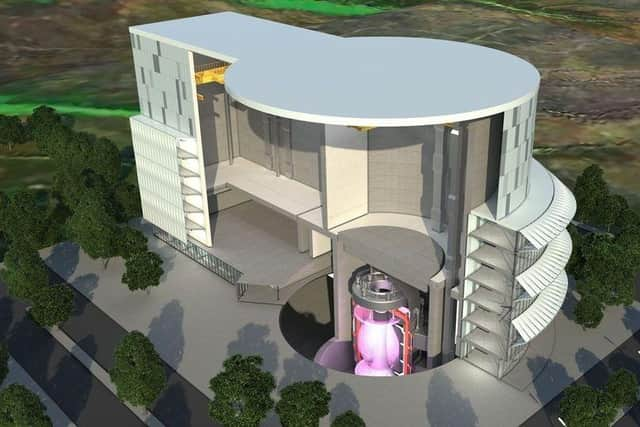Expert urges Scottish Government to back bid for world’s first fusion power plant
Declan Diver, professor of plasma physics at Glasgow University, suggested the Scottish Government's anti-nuclear stance could accidentally jeopardise the proposals.
Ardeer in North Ayrshire, once home to a huge dynamite factory, is one of five sites shortlisted for the prototype plant, which could be operational by 2040.
Advertisement
Hide AdAdvertisement
Hide AdThe UK Atomic Energy Authority says fusion could provide a near-limitless source of low carbon energy by copying the processes that power the sun and stars, where atoms are fused to release energy.


Professor Diver, who is convenor of the consortium behind the Ardeer bid, said the energy produced would be clean, renewable and sustainable, with no long-lasting radioactive waste products.
"The technological impact of having STEP [Spherical Tokamak for Energy Production] in Scotland will be colossal, absolutely colossal," he told Scotland on Sunday.
The Scottish Government opposes traditional nuclear fission plants on environmental, safety and cost grounds, but is seeking more information on the STEP proposals.
Professor Diver said it would be "wonderful" to get its endorsement.
He said the Atomic Energy Authority is expected to make recommendations on sites by the end of this month. The UK Government will then choose a site by the end of the year.
The expert estimated the plant would cost at least a billion pounds to build and would create thousands of jobs, attracting "a halo of innovation all the way around it".
It is expected to produce roughly the same amount of electricity as Whitelee Windfarm, but will occupy a “tiny fraction” of the space.
Advertisement
Hide AdAdvertisement
Hide Ad"The plan is that STEP will be a prototype power station, not a prototype research and development facility - it's actually there to generate power," he said.
"It will have modifications as it proceeds in its lifetime in order to optimise the design, and then they expect to build a fleet of these power stations across Europe and the world."
He said the technology is "not meant to replace renewable energy, such as wind and solar, which are fantastic things to have".
He added: "But a fusion power station is something you can switch on when the weather's bad or when you can't run your wind power or at nighttime."
Professor Diver said having an anti-nuclear stance "that could accidentally, in the minds of the population, embrace fusion, is relatively short-sighted".
He said: "It's worth bearing in mind that nuclear power generation accounts for around 30 per cent of the total power consumed in Scotland.
"We've already lost half of that capacity with the closure of Hunterston.
"Torness will close in 2028, but it's likely to close earlier than that.
Advertisement
Hide AdAdvertisement
Hide Ad"The Scottish Government's current position is that it will not permit new nuclear fission power stations in Scotland.
"But it has no believable strategy for making up the deficit for those, except to build a better interconnector and allow England to build a nuclear fission fleet and then suck the power up from there.
"So it's alright not to have it on our doorstep, but please can we have the output?"
He said the fusion plant could create a new on-demand energy source in Scotland.
Asked if he wanted to see vocal support from the Scottish Government, he said: "At the very least, I want to see the distinction when they talk about no nuclear power, they mean no nuclear fission power.
"I would love to see the Scottish Government being positive and endorsing the new era of fusion as a component in our overall energy supply.
"I think that would be wonderful, because it would then allow Scottish Enterprise, for example, to be wholeheartedly and publicly endorsing the initiative.
"At the moment they are slightly constrained because the Scottish Government is neutral and non-committal."
Advertisement
Hide AdAdvertisement
Hide AdPut to him that the Scottish Government's lack of enthusiasm could be off-putting when it comes to a decision, he said: "Yes, I think that's right.
"You can be absolutely sure that that dilemma will not be happening with any of the English sites."
A Scottish Government spokesman said: “We are aware of the Ardeer project’s involvement in the UKAEA’s STEP competition process and are engaging with its partners to understand more about the proposals.
“We believe that significant growth in renewables, storage, hydrogen and carbon capture provides the best pathway to net zero by 2045, and will deliver the decarbonisation we need to see across industry, heat and transport."
Comments
Want to join the conversation? Please or to comment on this article.
